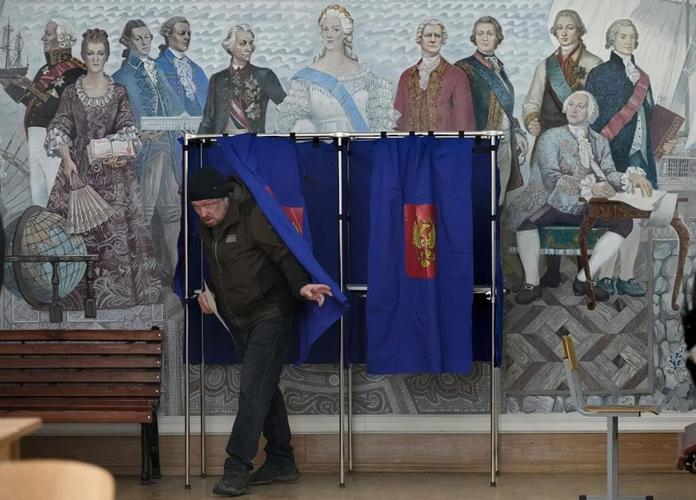
AP/ Dmitri Lovetsky,File.
Russian President Vladimir Putin secured another term following a predictable victory, as preliminary election results confirmed. Putin faced minimal competition and suppressed dissent effectively, ensuring his continued dominance. Despite muted opposition, some Russians quietly expressed discontent at polling stations.
The election's final day witnessed substantial turnout at polling stations across Russia, particularly at noon, prompted by opposition calls for protest. However, this did little to alter the inevitable outcome, emphasizing Putin's unwavering control over Russian politics as he extends his rule for another six years.
In response to the early results, Putin interpreted the high voter turnout as a demonstration of trust and hope in his leadership. Critics, however, viewed it as indicative of the election's predetermined nature, highlighting the absence of genuine choice for voters.
International reactions to the election were mixed. British Foreign Secretary David Cameron criticized the process, citing the lack of independent monitoring and limited voter choice. Meanwhile, Putin's opponents faced severe restrictions, with independent media stifled, and prominent figures like Alexei Navalny either imprisoned or deceased.
Despite the facade of democracy, independent election monitoring was scarce, leaving room for skepticism about the reported results. Putin allegedly garnered around 87% of the vote with most precincts counted, suggesting overwhelming support, although the validity of these figures remains questionable.
Navalny's associates urged dissatisfied citizens to participate in the noon protest, resulting in notable queues at polling stations worldwide. Even Yulia Navalnaya, Navalny's widow, joined the protest in Berlin, where she faced a lengthy wait to cast her vote.
Putin dismissed the significance of the protests, viewing them as part of the democratic process. However, the rare acknowledgment of Navalny during a press conference hinted at underlying tensions.
Some voters expressed hope for change but acknowledged its unlikelihood in the current political climate. Meanwhile, others remained loyal to Putin, reflecting the government's successful narrative control and suppression of dissenting voices.
The election spanned three days across various locations, including illegally annexed regions of Ukraine and online platforms. Despite attempts to maintain order, incidents of vandalism and unrest were reported, reflecting underlying tensions.
Despite the challenges, Ivan Zhdanov, head of Navalny's Anti-Corruption Foundation, deemed the opposition's call for protest successful, indicating some level of discontent among the populace.
Protests extended beyond Russia's borders, with sizable gatherings observed outside diplomatic missions worldwide. While Putin's victory may appear unchallenged, pockets of dissent suggest lingering dissatisfaction with his leadership.
Overall, Putin's reelection underscores the enduring grip of authoritarianism in Russian politics, with genuine opposition stifled and dissent marginalized. As he embarks on another term, the extent of his control over Russia remains firmly entrenched.















